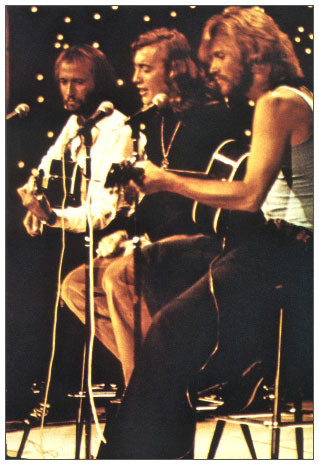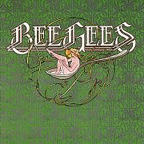|
"Jive Talkin'" The Bee Gees RSO 510 August 1975 Billboard: #1
One of the more depressing events of this low period was a series of shows at the Batley Variety Club in their home country of England. They performed their greatest hits to an audience that was more interested in getting drunk than hearing the Bee Gees.
While struggling through the early '70s, they recorded Trafalgar, To Whom It May Concern, and Life in a Tin Can, three albums that did nothing to increase their popularity. The lowest blow was Atlantic Records' refusal to release their next LP, A Kick in the Head Is Worth Eight in the Pants. Looking back on that self-indulgent effort, Barry told Dick Clark on "The National Music Survey," "When you write about yourself, it's introverted and it's death." Some groups would have considered disbanding at this point, but the three brothers were not ready to call it quits. Their manager, Robert Stigwood, introduced them to Arif Mardin, one of Atlantic's top producers. As RSO was distributed by Atlantic, Mardin was available to work with the Bee Gees. He produced the Mr. Natural album, and while it didn't result in any hit singles, it opened up the Gibbs to a new sound. Mardin took the Bee Gees away from Los Angeles and set up shop at Criteria Studios in Miami, Florida. Guiding and influencing their musical style, he had them concentrate on what was happening at Top 40 radio and discos. And having established a good working relationship with the group, Mardin was asked to produce their next album, Main Course. "Until Main Course, we still weren't bouncing off each other the way we should have been," Barry says in the Leaf biography. "We we got around to Main Course, We finally got into a way of thinking that suited the three of us, what we wanted to do and what we were going to do all the way. We were always split about that ever since the break-up. We could never really decide where we were going after that. And that's why all the music came out wrong." Each evening, on their way to Criteria, the brothers would drive across the Sunny Isles Bridge, according to The Legend, an illustrated story of the Bee Gees by David English. The tires of their car made a "chunka-chunka" sound as they crossed some railroad tracks. One night Barry's wife, Linda, turned to her husband and said, "Hey, listen to that noise. It's the same every evening. It's our drive talking." Barry looked at her and started to sing a song that evolved into their second number one single, "Jive Talkin'." But the Bee Gees were as cold as absolute zero, and there was not much chance that radio stations would get excited about a new single from the Gibbs. They repeated a trick they had used eight years earlier when their first single, "New York Mining Disaster 1941" was released. Promotional copies were issued on a white label with no identification of the artist. Debuting at number 87 on May 31, 1975, "Jive Talkin'" took 10 weeks to top the Billboard Hot 100 and begin the Bee Gees' spectacular comeback. - Fred Bronson, The Billboard Book of Number One Hits, Billboard, 1988.
No comments so far, be the first to comment. |


